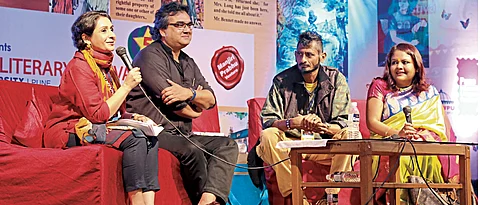

Sensuality, sex, erotica — words that make most of us squirm at the mention of them, forget a detailed description. In a country of Khajuraho and Geet Govind, it is a pity we have this awkward reaction to sensuality, said author Mona Verma at a session — Sensuality through the senses, words and emotions — at the Pune International Literary Festival in the city.
Sensuality, discussed on a Sunday morning at this session, saw apart from Verma, poet Sudeep Sen, and feminist erotic writer Srimoyee Piu Kundu in conversation with writer Raj Rao. “It is the theme of sensuality that binds all these writers,” Rao introduced the subject, adding, “Erotic writers can’t afford to be prudish since there is already so much prudishness in the air.”
“There are various aspects to sex, sensuality and erotica and each one of us can interpret it distinctly,” Rao added, before the writers begin narrating excerpts from their respective books.
“Erotica is not the only thing I write on,” laughed Sen, adding, “In India, we are so prudish about sexuality. We can’t discuss intimacy, desire, and homosexuality. But these are things our gods did, you just have to visit places like Khajuraho and our history is out there.”
Speaking of the challenges of erotic writing, Sen explained, “If you undercook it, it goes into the love-heartbreak kind of writing and if you push it too much, it goes into pornography. The skill is in striking that balance.”
Sen read out one such balanced poem titled Desire, ending it with a comment on the hushed up nature of discussing sex in our country. “We produce children without going to bed,” he joked.
Most of the Indian erotica writing thus ends up being pornographic. “That’s because we simply can’t get to think of sex without attaching lewdness to it,” said Verma, as she narrated an incident from her childhood. “In Class VII, we had a chapter on reproduction in our Biology textbook. Our teacher would ask every batch to read that chapter by themselves. If that was not enough, my granny with whom I grew up, once saw me reading that chapter. ‘Ae ki hai?’ (What is this?), she asked me. When I told her it was a chapter on reproduction, she said that I didn’t need to read it. It was okay to lose those couple of marks in Biology but not okay to spoil your head with this,” she recalled.
“I was told that widows were made to cut hair so as not to attract male gaze. When will our men take responsibility for their own physical senses and desires?” Verma questioned, pointing to the various layers of hypocrisy in our society.
Kundu seconded Verma as she said that it is all the more difficult for the society to digest that a woman can be an erotic writer. “I was once asked by this ‘educated’ person, ‘How do you know all this about sex?’. When I said that it was fiction that I wrote, she said, ‘But you are unmarried, how do you know about sex?’ and I didn’t know how to answer, so I just asked her if a crime writer commits a murder to write about it,” she said.
Kundu, who began erotic writing while she was a journalist, was inspired by this woman she saw in the bylanes of Byculla in south Mumbai. “She was in absolute control of her sensuality. I was extremely impressed with this woman. Met another such woman in Indore who was married at 16 to a man 25 years older to her suffering with an erectile dysfunction and was also abused by a godman. I decided to combine these two characters to make one strong story,” she explained as she read out from another short story of hers titled Chakka and speaking about her friend who befriended a transgender in Mumbai.
Coming back to erotic writing, Verma said that we need to appreciate sexual and sensual for what they are and not add any vulgar connotations to it, to which Sen added that if sensual content is written elegantly and delivered well, no one can stop you from writing erotica.
Is it difficult to write such stuff in India? “Writing itself is bold in this country considering that it is still not considered as a career. Also, censorship is seeping into literature,” Sen answered.
“We are living in very dangerous times but as an Indian woman, I am extremely proud of our erotic heritage. It’s one of the most beautiful cultures in the world. Don’t look for a quickie kind of erotica. We need to remove the cobwebs in our head,” Kundu concluded.
